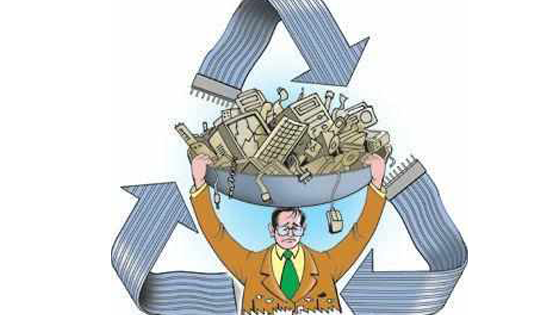Turning e-waste to electricity

Scientists at IIT, Madras have come up with a novel technique where e-waste can be used as a resource not only to treat waste water but also to generate electricity simultaneously, making it an important innovation to deal with fast growing menace of such hazardous waste in the country.
Under this technique, scientists use e-waste component like "LED\LCD (liquid crystal coated polaroid) glass" as an electrode material in 'Microbial Fuel Cells' (MFCs) which is primarily a technology used for only waste water treatment. Use of e-waste as an electrode, however, helps it to generate electricity and recover metals for reuse.
"The basic concept that we use in this study is 'use of waste to treat waste'. The MFC is a pollution free process. It considerably reduces the organic waste treatment cost by producing electrical energy without combustion of fossil fuels." Technologies available in the country at present are generally meant for only recovering and recycling components like glass, plastic, printed circuit board, hard drives, batteries and valuable metals. But this new technology, the scientists claim, can use LED\LCD glass component of e-waste for the twin jobs -- waste water treatment and electricity production.
As per the United Nations University report, 17 lakh tonnes of e-waste was generated in India in 2014. In its report released last year, the industry body Assocham had claimed that the country's e-waste production may increase by nearly three times in next three years -- from the existing 18 lakh tonnes to 52 lakh tonnes per annum by 2020.
At present, almost three-fourth of e-waste is handled in a very unscientific manner in absence of adequate number of waste disposal\recycling units in the country. Once the valuable items are recovered through manual breaking and extraction through rudimentary methods, remaining materials of e-waste is generally thrown in rivers, drains or disposed off in solid waste dumps. Burning of e-waste leads to generation of toxic fumes, adding pollution to air while its disposal in water bodies leads to.
Source: https://economictimes.indiatimes.com/news/environment/pollution/iit-scientists-develop-a-technique-to-generate-electricity-from-e-waste-in-eco-friendly-manner/articleshow/57334316.cms

Image Source : https://economictimes.indiatimes.com/news/environment/pollution/iit-scientists-develop-a-technique-to-generate-electricity-from-e-waste-in-eco-friendly-manner/articleshow/57334316.cms

